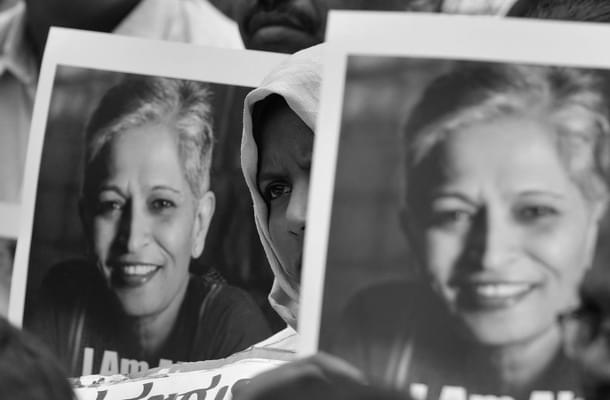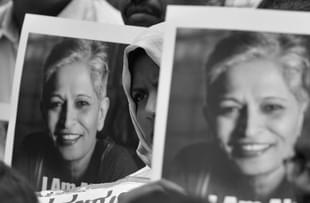Ideas
Freedom Of Speech: A Privilege For A Select Few Or A Right For All?
Mayuresh Didolkar
Sep 12, 2017, 03:24 PM | Updated 03:24 PM IST
Save & read from anywhere!
Bookmark stories for easy access on any device or the Swarajya app.


Earlier today (12 September), the youth wing of the Bharatiya Janata Party (BJP), called the Bharatiya Janata Yuva Morcha (BJYM), filed a defamation case against historian and columnist Ramachandra Guha for his remarks linking the BJP/Rashtriya Swayamsevak Sangh to the murder of far-left journalist Gauri Lankesh. Predictably, the left-leaning liberals were outraged, and shortly thereafter, Twitter was abuzz with phrases like ‘stifling dissent’ and ‘suppression of free speech’ with the usual accusation of authoritarianism thrown in for good measure.
In a discourse as cantankerous and polarised as in our country, it is very easy to lose sight of first principles and make arguments based on bias rather than on fact. To avoid it, one needs to take a step back and view all the questions related to this matter in their proper context.
At the most basic level, the BJYM can hardly be faulted for using a recourse that is available to them by law. The critics can offer one of two arguments – the recourse available by law is itself wrong and, in which case, they need to work on getting the law changed; or the recourse is necessary, but it is being misused, in which case their demand should be for safeguards, again through law, against misuse. In neither case can you fault a party for exercising an option available on the table.
Moving away from the fundamental question about the lawsuit and into its propriety, the critics need to decide once and for all their position on the ability of words to inflict harm. Essentially, they can either demand laws to curb the menace of trolls on social media and applaud when someone files a police complaint against an abusive or threatening troll or demand that the lawsuit against Guha be dropped. Not both.
I can already sense your average indignant liberal scream ‘false equivalence’ at this idea. They might make this argument – how can you put the threat of violence and slander in the same basket? I am not. This is a clever sleight of hand that the left is so skilled at pulling off. The fundamental issue here is not whether a person threatening to murder someone and a person accusing someone of murder without a shred of evidence are both in the breach of law in the same way; the issue is whether the person or organisation targeted by a speech, opinion-editorial or tweet is allowed to decide whether the words cause damage to them. Saying only threats of violence should be treated as a crime and hence taken to law is like saying the only crime prosecutable in a court should be the ones involving violence.
A casual reading of the Constitution will easily tell you that is not the case. We assign a different degree of seriousness to crimes based on the assessment of threat they constitute and a different level of punishment based on their nature. The remedies available are different; for example, if you dial 100 and inform the authorities of a robbery taking place, you are likelier to get a more immediate response than if you call the same number and inform of a fraud committed at your workplace. That does not delegitimise any action taken against the fraud later on.
The only other argument that left-liberals can make is, due to his scholarship and body of work, Guha can be trusted to make a more nuanced argument and is not likely to say something without a grounding in fact. This is a ‘moral superiority’ argument that essentially asks for treating individuals differently, based on their morality. Unfortunately, as the perception of morality is subjective, and the law needs to deal in absolutes, you can’t have different rules for Guha and a nameless online troll.
So, why do our left-liberals fail to understand something as basic as this? There can be several explanations for it, but the one I think makes most sense is that a lot of them view freedom of speech and expression as a privilege to be extended to a select few rather than a fundamental right available to all. A large part of the anger of liberal elite against social media comes from the democratising effect the medium has had on our discourse. The activism of the liberal elite against social media is similar to the agitations of trade unions against automation in industry.
In this debate, however, I also noted another, more worrying trend. American Enterprise Institute fellow and Wall Street Journal columnist Sadanand Dhume got into a heated debate with his peers over the lawsuit on Guha and, as the tweets show, he was accusing them of betraying their tribe.
Such an expectation from a senior journalist that his peers should close ranks based on allegiance to the profession rather than to the principles, should worry the common people. From police departments to large corporate houses, and from elected politicians to academics, whenever people start taking sides to prove their loyalty to a profession instead of staying true to their principles, it almost always spells trouble for the average person. For, from there, it is a short, slippery slide to recognising no other regulatory authority other than some ‘insider’s code’, and that typically leads to chaos.
If journalists do indeed value freedom of speech, they first need to respect diversity of opinions among their ranks. Accusing other journalists of, in this case, “intimidation of a scholar” or calling your competitor a “North Korean channel” shows the systemic intolerance the media has developed for dissent from its own. If voices of integrity are silenced by the intimidation of liberals, who will stand up and speak for the little guy the next time an elite chooses to exercise the notion that ‘some animals are more equal than others’?
The writer is a investment services professional and novelist. His latest novel The Dark Road was published by Juggernaut Publications.




